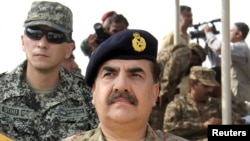RAWALPINDI, PAKISTAN —
Pakistan's army chief since 2007, General Ashfaq Kayani, has handed over the reins of power to his successor.
General Raheel Sharif, a career military officer, formally took charge from his predecessor Friday at an elaborate ceremony under tight security at military headquarters in Rawalpindi.
Main roads leading to the venue were blocked early in the morning and only invited guests — including federal ministers, diplomats and top military and civilian officials — were allowed into the area.
Army percussionists performed a brief drum-solo before outgoing General Kayani handed Sharif a wooden baton, symbolizing the transfer of power.
Kayani's six-year tenure as army chief — one of the most powerful positions in the troubled, military-dominated nation — was marked by the military's fight against the Pakistani Taliban, who have killed thousands of people in their battle against the state, and saw the nation's first ever transition of power from one democratically elected government to another during May's general election.
The 57-year-old Sharif, a career infantry officer, was little known outside military circles before Prime Minister Nawaz Sharif, who is not related to the new army chief, elevated him to the highest post. The announcement surprised many analysts because Sharif was third on the seniority list.
Before his latest appointment, Sharif was a lieutenant general who served as corps commander for two years before taking over as inspector general of training and evaluation, a position in which he is said to have revised the army’s training manual to focus more on the internal threat Islamist militants pose to the country.
According to retired army officer Athar Abbas, who served with General Sharif, the new commander is likely to continue some of his predecessor's policies.
"[General Kayani] was in full support of the democratic dispensation and he adopted a policy of least interference in the civilian affairs," said Abbas. "Also, he supported the government initiative of going after normalization of relations with India. So his main approach was to support the political government and bring the army out of civilian affairs. That was appreciated across the board and it also affected in a positive [way] on the morale of the armed forces.”
Pakistan has experienced three military coups since its independence in 1947. The army continues to indirectly influence political affairs, particularly when it comes to key foreign policy matters, making the top post one of the most closely watched in the nation.
General Raheel Sharif, a career military officer, formally took charge from his predecessor Friday at an elaborate ceremony under tight security at military headquarters in Rawalpindi.
Main roads leading to the venue were blocked early in the morning and only invited guests — including federal ministers, diplomats and top military and civilian officials — were allowed into the area.
Army percussionists performed a brief drum-solo before outgoing General Kayani handed Sharif a wooden baton, symbolizing the transfer of power.
Kayani's six-year tenure as army chief — one of the most powerful positions in the troubled, military-dominated nation — was marked by the military's fight against the Pakistani Taliban, who have killed thousands of people in their battle against the state, and saw the nation's first ever transition of power from one democratically elected government to another during May's general election.
The 57-year-old Sharif, a career infantry officer, was little known outside military circles before Prime Minister Nawaz Sharif, who is not related to the new army chief, elevated him to the highest post. The announcement surprised many analysts because Sharif was third on the seniority list.
Before his latest appointment, Sharif was a lieutenant general who served as corps commander for two years before taking over as inspector general of training and evaluation, a position in which he is said to have revised the army’s training manual to focus more on the internal threat Islamist militants pose to the country.
According to retired army officer Athar Abbas, who served with General Sharif, the new commander is likely to continue some of his predecessor's policies.
"[General Kayani] was in full support of the democratic dispensation and he adopted a policy of least interference in the civilian affairs," said Abbas. "Also, he supported the government initiative of going after normalization of relations with India. So his main approach was to support the political government and bring the army out of civilian affairs. That was appreciated across the board and it also affected in a positive [way] on the morale of the armed forces.”
Pakistan has experienced three military coups since its independence in 1947. The army continues to indirectly influence political affairs, particularly when it comes to key foreign policy matters, making the top post one of the most closely watched in the nation.





